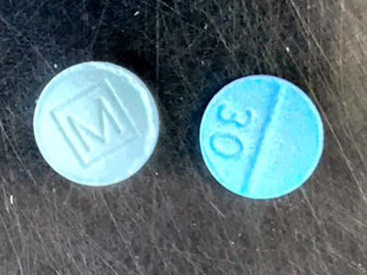Feds Warn of Counterfeit Oxycodone Deaths
/By Pat Anson, PNN Editor
In the wake of four fentanyl overdoses in southern California, federal authorities have issued a public safety alert warning drug users about a lethal strain of counterfeit medication designed to look like 30mg oxycodone tablets.
The blue bills have the letter “M” in a box on one side and the number “30” with a line down the center on the other. On the street they are referred to as blues, M-30s or Mexican Oxy.
The pills were found at the scene of four fatal overdoses in San Diego County last week. The deaths in Poway, Santee, Lakeside and Valley Center were all reported within 24 hours.
Although tests on the pills are ongoing, authorities suspect they are laced with illicit fentanyl or carfentanil, which can be fatal in tiny doses.
SAN DIEGO SHERIFF’S DEPT. IMAGE
“That heroin, that meth, that coke, that oxy you think you are taking? Well, it just might have fentanyl in it, and it just might be the last thing you ever do,” U.S. Attorney Robert Brewer said in a statement. “I cannot be more clear than this: Fentanyl may be the costliest drug you ever do, because you may pay with your life, and you won’t even know you took it.”
Brewer said border seizures, prosecutions and overdoses are on pace to hit all-time highs in San Diego County by the end of 2019. The Medical Examiner’s Office has confirmed 50 fentanyl-related overdose deaths so far this year, plus another 28 suspected but yet-to-be confirmed cases.
If the trend continues, the death toll could potentially reach 130, which would amount to a 47 percent increase over last year’s total of 90 deaths. The victims are overwhelmingly male, with the average age about 36.
“Just when we think it can’t get any worse, the latest numbers prove us wrong,” Brewer said. “I am alarmed by the dramatic surge in trafficking activity and deaths, particularly of young people. San Diego is the fentanyl gateway to the rest of the country, and we are working hard to close that gate with interdiction, prosecution and education.”
Federal authorities have confiscated 1,175 pounds of illicit fentanyl – more than half a ton -- at or near the international border so far this year. In addition, there has been a record number of seizures involving counterfeit blue pills labeled M-30 that contain fentanyl. The pills sell on the street for $9 to $30 each and are appearing around the country.
Ports of entry near San Diego are major transit points for illicit fentanyl smuggled in from Mexico. The fentanyl is usually transported in vehicles, often by legal U.S. residents acting as couriers.
A recent report from the Wilson Center found that Mexican cartels are playing an increased role in the fentanyl trade.
“San Diego is the fentanyl gateway to the rest of the country.”
“Chinese companies produce the vast majority of fentanyl, fentanyl analogues, and fentanyl precursors, but Mexico is becoming a major transit and production point for the drug and its analogues as well, and Mexican traffickers appear to be playing a role in its distribution in the United States,” the report found.
“Both large and small organizations appear to be taking advantage of the surge in popularity of the drug, which is increasingly laced into other substances such as cocaine, methamphetamine, and marijuana—very often without the end-user knowing it. To be sure, rising seizures of counterfeit oxycodone pills laced with fentanyl illustrate that the market is maturing in other ways as well.”
Last week a former Mexican police officer was indicted for fentanyl trafficking by a federal grand jury in Texas. Assmir Contreras-Martinez, 30, was pulled over by a Texas trooper on Interstate 40 in Amarillo in May. About 73 pounds of illicit fentanyl powder was found inside his 2007 Ford Explorer, enough to kill 10 million people, according to DEA experts.
Contreras-Martinez admitted he was paid $6,000 to transport the fentanyl from California to Florida and that it was his second such trip. Before his unlawful immigration to the United States nine months ago, Contreras-Martinez had been employed for eight years as a municipal police officer in Cananea, Sonora, Mexico.




